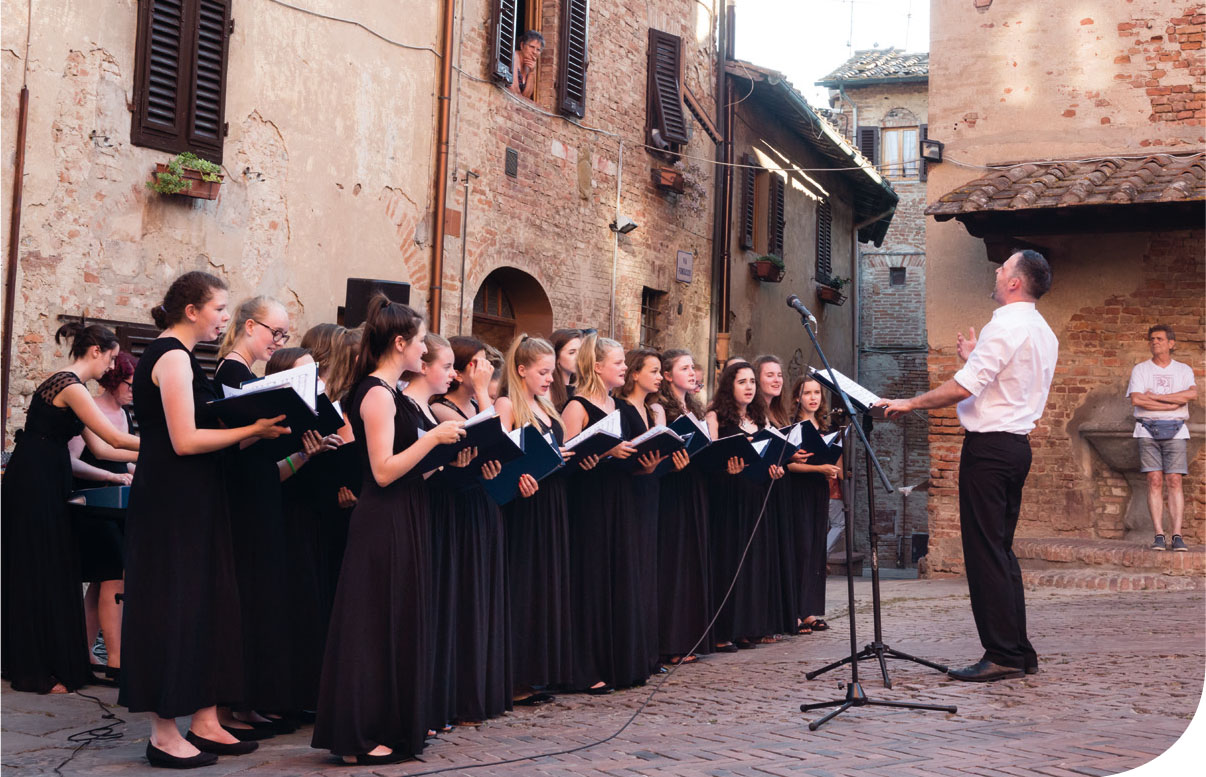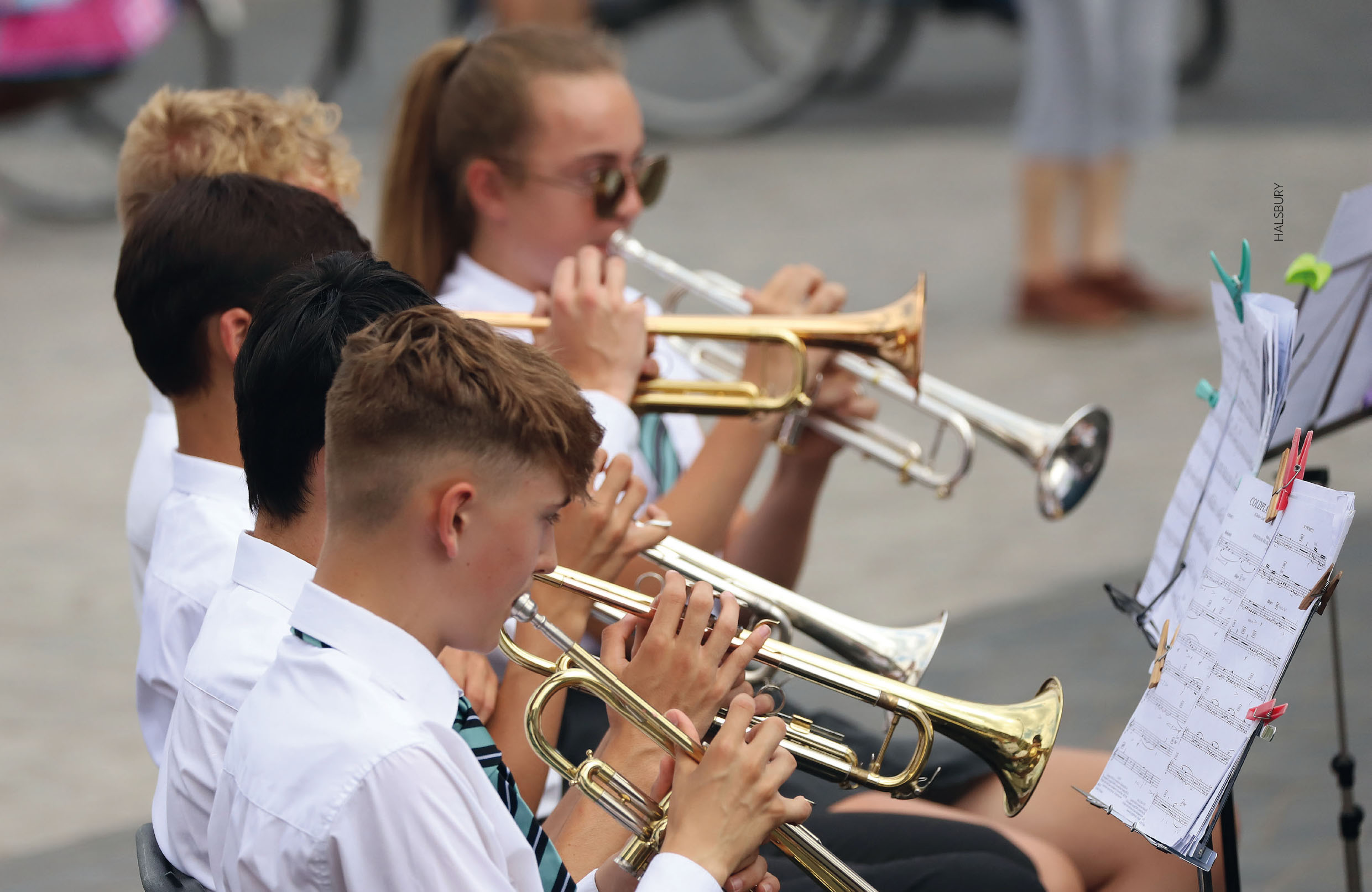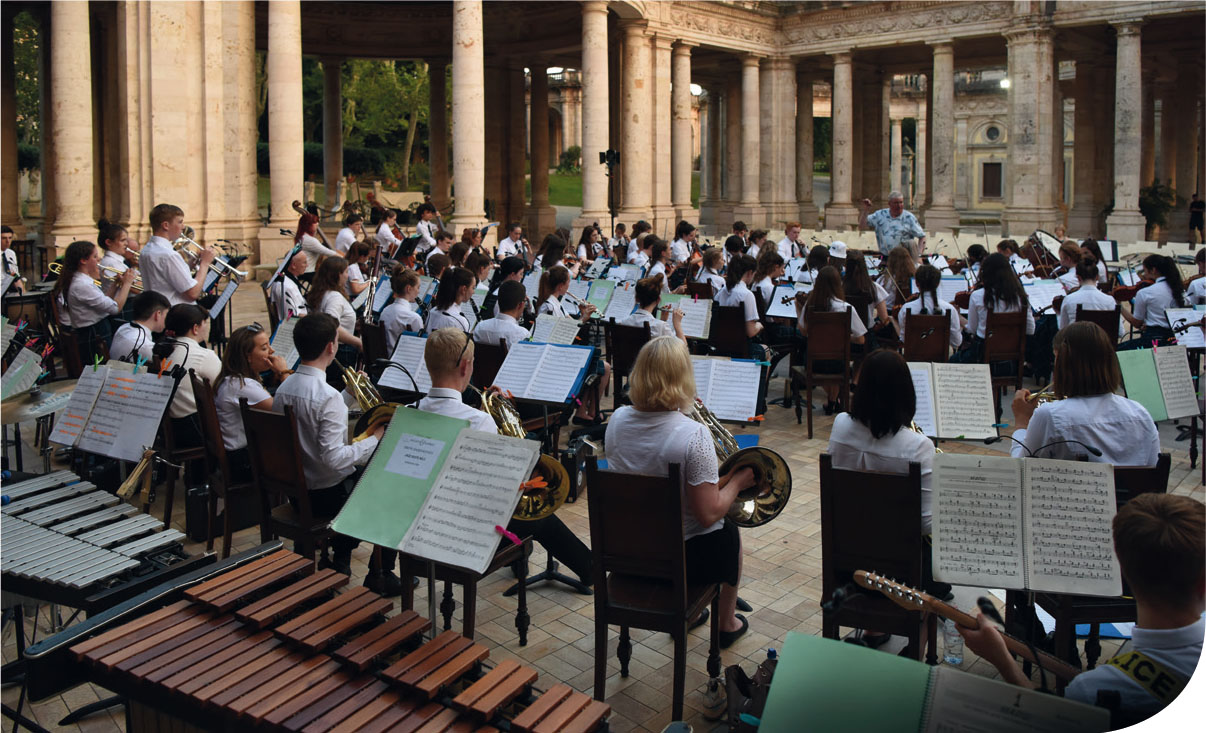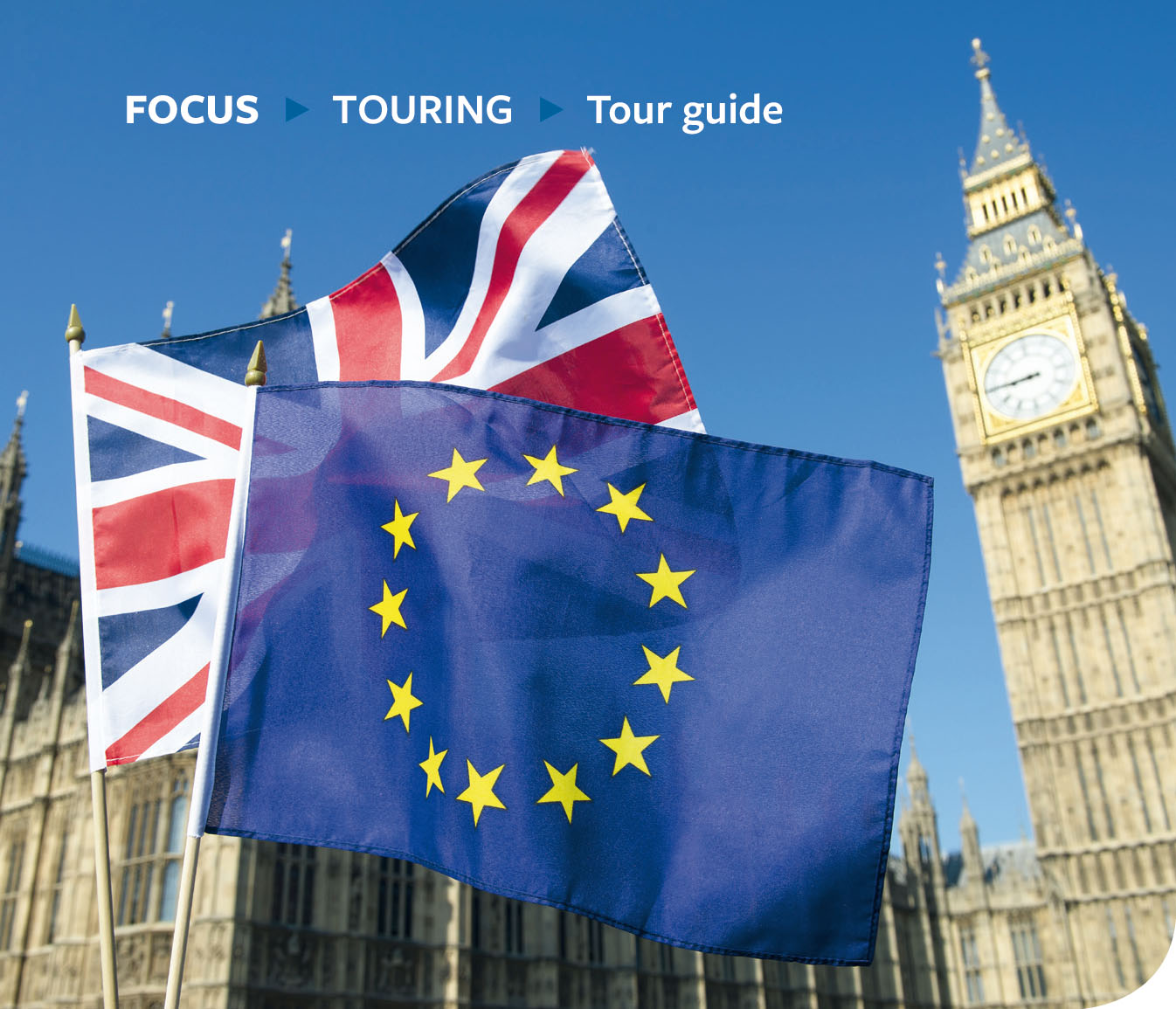
A music tour offers you boundless opportunities to challenge your students, expand their horizons, and keep you in ‘#1 Teacher’ mugs for the rest of your career. Done right, a music tour will give students memories that will last a lifetime and provide them with performance experience that will result in substantial improvements in their playing – after all, if they can play to crowds of hundreds in a strange city with little idea how they will be received, what do they have to fear from their Grade 8 exam or conservatoire audition? That said, it is a lot of responsibility for any teacher to take on, and not one that should be entered into lightly. With some careful consideration, and knowing your options, it should be within reach of any teacher.
To start with, you're going to want to choose the timing of your trip. From speaking to tour operators, it quickly became apparent that planning at least 12 months in advance was key to success, with some going so far as to recommend an 18-month lead-in period. This will give you plenty of time to get everything signed off by the headteacher, gain all the necessary permissions, and give parents more time to pay – if you're looking to reduce costs through fundraising efforts, having the time to implement these is key. When you're thinking about expected costs, you will probably have an idea of what you can reasonably expect a student to be able to pay and can plan things like food, accommodation, transport, destination, and additional activities around this.
Having a timescale and a cost in mind will also help you work out if it is possible to implement a payment schedule so that parents aren't having to pay the whole amount up front, which will definitely increase the likelihood of students being able to attend. Advice from experts recommends that you collect two lots of non-refundable deposits, separated by a period of eight weeks. Having a clear payment plan in place will keep parents engaged and reduce the number of drop-outs. It's worth being upfront at the beginning if there is any financial assistance available or if the quoted cost is dependent on fundraising efforts being reached to prevent confrontation further down the line.
As time goes on, you're going to need to collect money as well as information from parents, such as dietary and passport information. Alahree McDonell, the senior account manager for concert tours with Club Europe helpfully suggests that, ‘it's a good idea to enlist the help of someone in a non-teaching position to help with the admin.’
Picking a destination
Once you've got a date in mind, the next step is to choose where to go. The date will undoubtedly have an impact on this decision, depending on if you've got your heart set on your brass band performing in Wenceslas Square in the snow or your jazz ensemble wowing tourists on a beach as the sun shines off their saxophones. No two places, even within the same country, are the same so you're always guaranteed to be giving your students a fantastic experience. Cost will also play a large factor in your plans, with European destinations allowing you to travel by coach or train, which will prove far cheaper than expensive flights and transfers.

© Aleksandra Stepien
A Halsbury tour to Tuscany
McDonell has this to say on the subject: ‘If travelling in the summer, Belgium remains the most popular destination and a great “starter” tour thanks to its close proximity to Calais and value for money. There are venues and excursions to suit most groups from churches and retirement homes to open square and theme parks. For groups who love Italy but want to try somewhere new, Friuli Venezia Giulia borders Slovenia and Austria and has a distinctly Austro-Hungarian feel, especially in the capital of Trieste. It works particularly well in the summer months and groups can perform in beautiful villas, cathedrals, outdoors square on the beach, and even across the border in Slovenia or Croatia. Groups looking for something in spring or autumn will enjoy Prague. Thanks an extensive mailing list of music lovers, concerts in and around Prague are always extremely well-attended and groups get to perform in some of the most prestigious venues in the Old Town.’

You might want to do some rehearsals wearing sunglasses, just in case!
The team at Rayburn Tours agrees with looking close to home, citing the cheaper option of coach travel as an attractive factor, and adds: ‘For experienced travellers, we recommend Catalonia and Tuscany. These all great places for groups that want a well-balanced performance itinerary that consists of indoor and outdoor performance venues. These locations also provide breath-taking excursions that will not only enhance student's cultural appreciation, but also give them unforgettable experiences that they can tick off their bucket lists.
‘If you're looking for something even more special, Malta would be our top pick. With picturesque landscapes and a fascinating history, the island's stunning coastline provides the perfect backdrop for both indoor and outdoor performance opportunities.’
Other interesting suggestions from tour companies include Noordwijk in the Netherlands, Lake Garda in northern Italy, and even Canada's Toronto if you're looking for a destination outside of Europe. Indeed, the imminent issue of Brexit may give a lot of teachers pause before choosing the continental mainland as a destination, lest the situation rapidly change. If you're looking to avoid the situation entirely, then the OneStage tour company recommends considering destinations such as Costa Rica and Argentina, which offer unique experiences such as huge coffee plantations and cattle ranches alongside their musical locations.
Regarding the thorny issue of the referendum, the tour companies that I spoke to had – quite understandably – a fair amount to say. As a representative of Rayburn says, ‘The travel advice surrounding Brexit is constantly evolving’, which makes planning around it frustrating to say the least. Delphine Lock, head of music tours at Halsbury is keen to reassure me on the matter though: ‘There has also been some discussion on the possibility of UK citizens requiring visas to visit the EU after Brexit. For short term visits, such as school trips, this is very unlikely to be the case. The EU Commission has already stated that Britons will not require visas for short-term visits, as long as the UK offers the same to EU citizens, and it seems likely that this will be the case.’
‘With regards to passports, if there is no deal struck, then it is likely that from 31 October 2019, you will need six months of validity left on your passport before you travel. If you do renew your passport early in order to ensure you have enough validity, it does seem likely that you will lose any extra months, which is not currently the case, so that is something that is worth bearing in mind.’
This advice about passports is useful to remember wherever your trip may be so be sure to look up the requirements of your destination country well in advance. As Lock says: ‘Remind parents of this requirement as early as possible in the trip planning process, to ensure that all passengers are able to travel with valid passports. Further information and advice can be found on the government's dedicated website.
Tour operator
Already, I've made mention of tour operators and working with one is your best chance of success when it comes to doing a tour. Theoretically, it would be possible for you to arrange absolutely everything yourself but even with the best will in the world, it is likely that you will miss something that is absolutely crucial to the trip. Regardless of the size of the touring group – you may only have a quartet or small ensemble – bringing in the experts will undoubtedly improve the experience of both the students and the staff.

© Oakford Media
Shostakovich in the sun on this Rayburn Tours trip
Many of them provide similar levels of support at every step of the process, but it's worth taking the time to get clued up about what you're getting out of them for your money. If you go with one not mentioned in this piece, check their credentials with places like the Association of British Travel Agents, Air Travel Organiser's Licence, and the School Travel Forum to give you confidence in their ability to deliver. As well as sorting out things like your transport and accommodation, a tour operator can also help you plan a robust trip and will often know great day trips to places that are free or cheap. Several companies will also provide you with support while you are away – often this means 24-hour phone assistance but its probable that you will be given a member of staff who knows the area well and can sort out problems as they arise. Again, clarifying something like that and figuring out if it is something you need is worth establishing early on.

© Lazyllama/ Adobe Stock
Brexit shouldn't stop you planning a tour this year
While a tour operator will definitely make your life easier, there will still be several things that you need to sort that it would not be able to do. As you know your students best, it is up to you to prepare a thorough risk assessment (we published guidance on this last month). Lock also points out that, ‘The teacher also needs to ensure that students have the necessary visa and travel documents should they require them for the country they are travelling to.’ You will need to do the work, but the tour operator will probably be able to support you and point you towards useful resources either from its own website or ones it can recommend.
Other considerations
Depending on the age of the tour group, you may need to take a closer look at your intended schedule. A younger group may need more structure in their day, while sixth-form students are probably going to appreciate more free time. Whatever the situation, make sure you establish clear boundaries before the trip and remember to stick to them – if students perceive that you are taking a laxer approach to the rules that were given to their parents, you are going to have a difficult time getting them to follow them when they absolutely need to. The advice from Rayburn when planning your trip is to ask yourself a number of key questions: ‘If the aim is to improve their musical ability, then performances and practice will help to achieve this. If it's more leisure and culturally based, then adding a mix of excursions and leisure time could be a more suitable option.’
Rebecca Hall, marketing executive of the NST Group, also recommends finding a good balance: ‘Don't forget the fun too. A day at a theme park or water park can be a much-needed break to relax and bond as a group after working hard for your performances!’
If you're planning on taking a mixed-age group then one approach that can work well is bringing in older students as peer group leaders, where they are helping out staff by doing things like keeping an eye on younger students or setting up the room for any rehearsals that you've got planned. By entrusting them with a measure of responsibility, you can add to their skills and experiences in ways that will put them in good stead when they are completing applications for higher education or employment. This is a model that my school used and I remember having a great deal of respect for these older ‘cool’ kids – who I would see play amazing solos and who were happy to hang out with me and my friends – to the point that I knew I wanted to keep going on trips until I could do what they were doing.
When it comes to choosing repertoire, there are a few important things to bear in mind. Your tour operator may be able to give you some advice on the sort of music that goes down well in certain areas but it's certainly worth doing your own research. Think about how it will look to the locals. Are you visiting a place that will appreciate a group of British students playing the music of a local sub-culture? Would it come off as patronising if you only played British songs?
Above all, make sure that you give yourself enough time to practise the music so that the students will feel confident playing on the day – there's no sense planning a trip for 18 months and then throwing a new piece of music at them two weeks before you leave. Don't add unnecessary stress. It's the only part of the trip that you get to rehearse so make the most of it! If the group you're planning on taking doesn't have much performance experience, make sure to plan in some concerts throughout the year and maybe take them on a trip to somewhere like a local cathedral to give them an experience of venues that aren't the school hall.
Bon voyage!
Hopefully, this has given you some ideas and given you the confidence to give a tour a go. Wherever you decide to go, I am sure that you and your students will have a wonderful time – if you're happy to share your experience of going on tour, then please do get in touch even if it's only to send us some images!
Fundraising suggestions
There are plenty of ways to raise money for a school tour, which could also have the added benefit of strengthening community relations and giving your students new and interesting experiences. Obviously, these all come with their own set of risk and reward factors so plan them carefully and make sure it's not detracting from the tour itself. Don't overload yourself – choose maybe three activities and do one each term.
- Hold a special concert and charge money for tickets and refreshments
- Add an extra £1 onto existing ticketed events at your school
- Approach local businesses and parents to get items for a raffle
- Arrange a bag-pack at a local supermarket
- Take the musicians busking in the town centre (check local laws!)
- Do an in-school bake sale where the musicians make the cakes
- Put on an after-school car wash
- Seek sponsorship from local businesses in exchange for logos on tour t-shirts
- Organise a fun run or other sponsored activity – 24-hour rotating orchestra anyone?
- Host a car boot sale in the school grounds and charge for pitches.
Tour companies
The companies mentioned in this piece all have their own websites where you can find out more about what they offer. It's well worth checking them out as many offer additional resources that can be used to help your planning, as well as classroom material. Make sure to get quotes from two or three and having close look at what they offer for that quote before making your choice.




